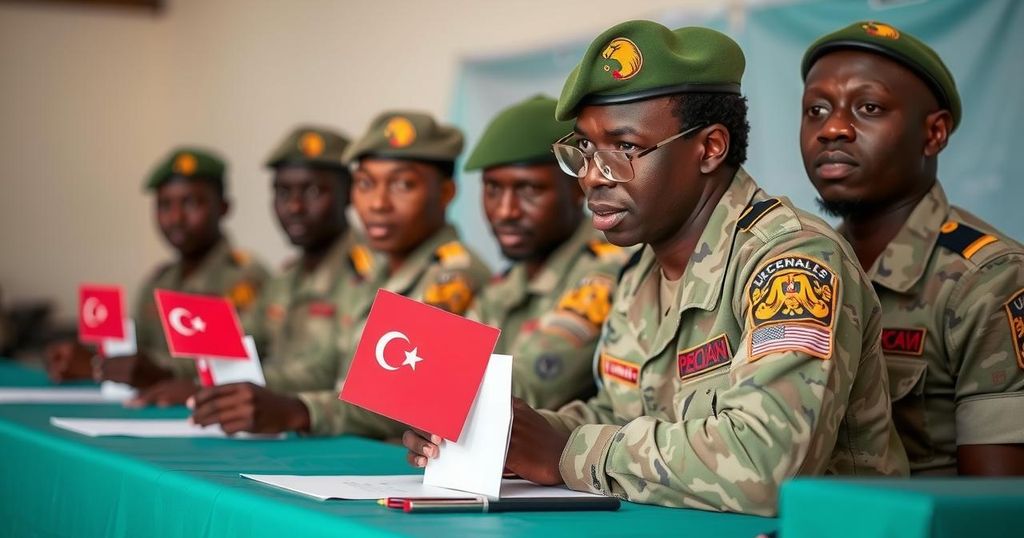Chad’s electoral commission has requested military protection for officials and candidates ahead of the December 29 elections due to increasing violence from opposition supporters disrupting campaign activities. The elections come after a three-year transitional period following President Idriss Deby’s death. However, opposition parties criticize the elections as a facade for consolidating power. Amid these tensions, allegations of electoral manipulation persist, casting doubt on the integrity of the upcoming polls.
Chad’s electoral commission, known as the National Election Management Agency (ANGE), has sought military assistance to ensure the safety of election officials and candidates as the country approaches elections on December 29. This request is prompted by an increase in violent incidents where opposition supporters have employed clubs and iron bars to disrupt campaign activities of the ruling Patriotic Salvation Movement (MPS) across various towns, including Ndjamena and Moundou.
ANGE has reported ongoing disruptions to the election campaigning process, indicating that heightened tensions could escalate into armed conflict if the military does not provide adequate protection. With approximately 8.3 million registered voters out of 18 million citizens, the elections are intended to conclude a three-year transitional period following the death of long-term leader Idriss Deby Itno in April 2021. The political landscape is complex, marked by over 180 political parties contesting in the parliamentary elections and thousands more participating in local elections.
However, more than 75 opposition parties and civil society organizations have characterized the upcoming elections as a “masquerade,” alleging that President Mahamat Idriss Deby Itno is leveraging the electoral process to bolster his and his party’s hold on power. Reports indicate that opposition supporters have hindered not only MPS campaign operations but also utilized violent methods to suppress candidates and their rallies.
Notably, Avocksouma Djona, president of Chad’s Party of Democrats, insists upon postponing the elections due to perceived biases in the election management body—alleging that its officials were appointed by Deby and that the constitutional court is under his control, further undermining electoral integrity. Meanwhile, President Deby has committed to conducting fair elections but has faced skepticism from opposition groups concerning the legitimacy of the electoral process that they allege is designed to ensure his continued power.
In conclusion, the elections in Chad are shrouded in tension and uncertainty, with concerns about violence disrupting the electoral process and allegations of state manipulation by those in power. Observers express caution as they prepare to monitor the proceedings with a critical eye amidst these claims of electoral malpractice and political intimidation.
The context of the upcoming elections in Chad involves significant political unrest and a violent backdrop that threatens the integrity of the electoral process. Since the death of Idriss Deby Itno in April 2021, Chad has been navigating a transitional phase under the leadership of his son, Mahamat Idriss Deby Itno. This transition was supposed to facilitate a return to civilian rule; however, it has turned contentious with numerous complaints regarding election management, accusations of violence against opposition members, and broader concerns about the legitimacy of the electoral process within an increasingly polarized political environment. The involvement of the military and allegations of opposition violence highlight the fragile political state in Chad, making the upcoming elections a pivotal moment for the country’s governance and civil stability. The potential for conflict looms large, as shown by the recent violent incidents aimed at disrupting MPS campaign activities. Ultimately, these dynamics play a critical role in how the elections will unfold and how the international community perceives Chad’s progress towards democratic governance.
In summary, Chad is approaching critical elections amid escalating political violence and deep-rooted skepticism surrounding the electoral process. As the electoral commission requests military support for safeguarding election officials, the backdrop is complicated by claims from opposition groups of political maneuvering and control by the ruling party. The situation underscores a profound struggle for power and civil rights, with significant implications for Chad’s future governance and societal stability as the electoral date nears.
Original Source: www.voanews.com







